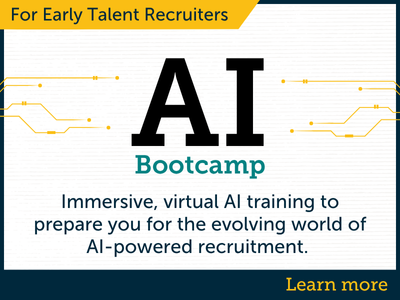The traditional office visit has evolved into an opportunity for organizations to give job candidates a glimpse into their culture and a vision for their career there, provide them with information about potential career paths, and more.
Gone are the days of companies taking students to their office and expecting them to be wowed by a few sleek cubicles and a shiny cafeteria, says Kayla Foy, university relations lead with Verizon.
“Office tours have become ineffective due in part to the rise of remote work and the lack of personalized experiences,” she explains.
Be a Part of NACE25, the Premier Career Services & College Recruiting Experience!
This June, join us at NACE25, the premier event of the year, where more than 2,200 career services professionals, early talent recruiters, and business solutions providers will gather in Philadelphia, PA. Don't miss this unique opportunity to connect, learn, and engage in person and virtually. Learn more and register for NACE25 today!REGISTER TODAY
“Today’s students care about culture and community. They want to know the real deal—how they’ll be supported in their professional growth; whether there are opportunities to network and build community; and if they’ll feel comfortable being their most authentic selves, no matter their background. At Verizon, our university relations team has found a niche way to bring this to life by simply inviting students into our world for a day.”
A successful immersion experience will leave students feeling like they can see themselves at the company and, therefore, eager to apply. Or at the very least, they will be excited to tell a friend about all of the cool things they’ve learned.
On the other hand, Foy explains, it is important to avoid taking a one-size-fits-all approach to such experiences.
“For example,” she says, “if there’s something that your company doesn't truly prioritize and value, don’t highlight it just for the sake of the event. Students tend to have a really keen eye for performative actions, and you don’t want them to associate your brand with being disingenuous.”
Liz Langemak, Verizon’s associate director of university relations, says that it’s never too soon in the recruiting process to show students everything Verizon has to offer, especially in the early career space.
“Inviting first- and second-year students into our immersion programs means we’re able to share opportunities and career paths that they haven’t yet imagined or thought possible for themselves,” Langemak says.
“We also see this as a partnership with schools; cultural immersions are a form of experiential learning that help students to understand what they want and don’t want in their first roles post-college. The best immersions emerge out of ongoing conversations with universities, where we learn how to help each other and serve student needs. At Verizon, we want exactly what our higher ed partners want for students: a meaningful process of experiential learning and discovery.”
She says that the Verizon campus team and the broader Verizon community believe that the best experiences can do much more for students than simply confirm what they want.
“The best experiences can also teach us what we don’t want, and—most powerfully—show us pathways that surprise and excite us,” Langemak points out.
“Students coming to one of our immersions get to hear from V Teamers who have spent their whole careers at Verizon because we prioritize new experiences and opportunities. They also get to learn more about opportunities at Verizon that they might not have known about, but that spark their imaginations.”
To create effective immersion experiences, organizations need to be receptive to making adjustments and continuously fine-tuning their program.
“Our team continues to learn so much from every immersion we lead, whether that be about event timing, strengths of individual hub locations that we want to showcase, or even how to make the most of lunchtime,” Langemak says.
“One important, overarching lesson to remember is that a company’s most important resource is undoubtedly its people, and the people are what make the culture. The more time students can spend in conversation with individuals, the stronger the immersion program will be."
Kayla Foy and Liz Langemak will present during NACE25.






